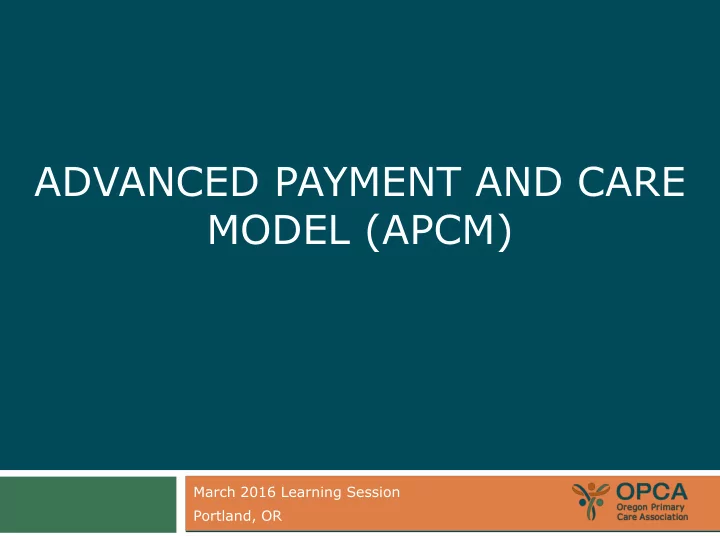

ADVANCED PAYMENT AND CARE MODEL (APCM) March 2016 Learning Session Portland, OR
Pre-Work 2 What did your team structure look like before APCM? 1. What changes have you made since joining the APCM program? 2. What roles are you looking to expand? 3. What’s the timeline? • Any major successes and barriers? • Any new roles/functions related to SDoH, health and wellbeing interviews, • and/or empathic inquiry conversations? How are your growing understanding of population and 4. subpopulation needs supporting the creation and expansion of roles at your health center? Are you at a stage where you can identify a population of focus you would like to • tailor interventions for? What would be particularly helpful at the March FTF to enhance 5. your team work?
Primary Care Team Receptionist • Team RN/LPN • Health Coach • Panel Manager • Patient & family & Provider- MA Teamlet RN Care Managers • Patient & Patient & Core CHWs • family & family & Cent Pharmacists Provider- Provider- • Team MA MA Behavioral Health • Teamlet Teamlet Specialists Administrative Staff • Extended Care Team Community
4 How far can/ought we go?
And we know … 5 taskwork AND teamwork matter.
Critical Practical Advice Consideration And we know Cooperation Build collective efficacy through promoting early wins • Build trust through the discussion of past experiences relevant to team • goals 6 Conflict Be proactive – set expectations for how to handle conflict • Be reactive – confront conflict when it occurs instead of ignoring it • Coordination Self-correct via huddles and debriefs • Ensure team member roles are clear but not overly rigid • Communication Share unique information among team members • Utilize closed-loop communication patterns • Coaching Use coaches to diagnose and address teamwork problems • Distribute leadership responsibilities among multiple members of the • team Cognition Foster understanding of roles and how these roles fit together through • cross-training Establish a clear shared understanding of team functioning through self- • correction Composition* Select for a strong team orientation • Compose teams based upon both the teamwork and taskwork demands • Context* One size does not fit all – anticipate and plan for contextual teamwork • challenges Set organizational policies, practices, and procedures that promote and • support teamwork Culture* Create a hybrid culture that leverages pro-team values and creates a safe • environment for voicing ideas and concerns Create a team culture that embraces similarities and respects differences • Salas et al. Understanding and Improving Teamwork in Organizations: A Scientifically Based Practical Guide. Human Resource Management. 2014.
Relational Coordination 7 How frequently do people in each of these Frequent Communication groups communicate with you about [focal work process]? How timely is their communication with you Timely Communication about [focal work process]? How accurate is their communication with you Accurate Communication about [focal work process]? When there is a problem with [focal work Problem Solving process], do they blame others or work with you Commmunication to solve the problem ? Do people in these groups share your goals for Shared Goals [focal work process]? Do people in these groups know about the work Shared Knowledge you do with [focal work process]? Do people in these groups respect the work you Mutual Respect do with [focal work process]? Jody Hoffer Gittell “ Relational Coordination Research Collaborative ” www.rcrc.brandeis.edu
Building on our strengths 8 Foundational Elements: Leader Facilitator? Decision making Agenda setting Behaviors: Facilitative, domineering, passive, aggressive, etc. Evaluation Process: 10 min self/team assessment Report out
Miniclinics 9 Questions/issues with taskwork or teamwork 20 minute sessions where you can tap into the brilliance in the room Total of 9 slots tomorrow Sign up during break with a quick description of what you’re struggling with/ thinking through that your peers might be able to help with
Recommend
More recommend